thinking and learning
SCHOOL PURPOSE STATEMENT
SCHOOL
PURPOSE STATEMENT
How we prepare students for life
Kia māramahia te ora e te
akoranga Let learning enlighten life
Our purpose
How we prepare students for life Kia māramahia te ora Let learning enlighten
Ōtūmoetai College is an inclusive learning community where identity, optimism and challenge form the foundation for all learners to flourish in a dynamic world. The learning environment will enable students to achieve their personal best in their academic studies, the arts, sporting and cultural pursuits.
During their journey, our students will grow into powerful thinkers and learners who embrace diversity, resilience and develop meaningful relationships with others.
This is our purpose and our commitment.
The design of teaching and learning at Ōtūmoetai College is predicated on the fact that the future will not be the same as the past.
Message from our Principal
A culture of thinking and learning
At Ōtūmoetai College, we believe that fostering identity, optimism, and the ability to embrace challenges within a robust thinking and learning framework is essential for preparing our students for their future.
We believe that students who can make informed decisions and apply knowledge in new situations will excel in a workplace that increasingly values the effective use of information.
To prepare our students for this future, Ōtūmoetai College has a strong moral purpose to help every student achieve their personal best. This purpose is exemplified through our focus on indicidual success, supported by intentional learning experiences.
SCHOOL PURPOSE STATEMENT
How we prepare students for life
Our dedicated teachers are committed to motivating and inspiring students, championing and promoting positive change in our classrooms, and planning for the future. We want our students to understand that their abilities are not fixed but will grow as they receive quality teaching and respond to feedback.
Kia
Our shared sense of community and partnership with our families in educating each and every child is fundamental to our students’ continued learning and wellbeing. Whānau is what makes this school a great school.
māramahia te ora e te akoranga
Let learning enlighten life
We are excited to welcome you to our kura, and we trust that you will enjoy your tour of Ōtūmoetai College. We invite you to share in our purpose and for your child to become a part of us.
Russell Gordon Principal
Our purpose challenge form the foundation for all learners to flourish in a dynamic world. The learning environment will enable students to achieve their personal best in their academic studies, the arts, sporting and cultural pursuits. During their journey, our students will grow into powerful thinkers and learners who embrace diversity, resilience and develop meaningful relationships with others. This is our purpose and our commitment.
Ōtūmoetai College is an inclusive learning community where identity, optimism and
Our vision education andsocial responsibility are valued and all learners achieve.
Ōtūmoetai College, here we stand, creating resilient learners where culture, diversity,
The design of teaching and learning at Ōtūmoetai College is predicated on the fact that the future will not be the same as the past.

A culture of thinking and learning
SCHOOL PURPOSE STATEMENT
Powerful thinking
How we prepare students for life
Powerful thinking and learning articulates the collective aspirations and learning for students’ learning.
An Ōtūmoetai College powerful thinker and learner can:
• Collaborate effectively with others
Kia māramahia te ora e te akoranga
• Value their own and others’ hauora
• Be resourceful and open to possibilities
Let learning enlighten life
• Connect and apply their learning for success
•Be an effective and confident communicator
•Use a range of media to articulate with clarity
•Take risks in learning and persist through difficulties
•Demonstrate creative and critical/analytical thinking
•Be responsive to context, audience and environment
The design of teaching and learning at Ōtūmoetai College is predicated on the fact that the future will not be the same as the past.
Our Values
A culture of thinking and learning
• Kia Rangatira – Striving for Personal Excellence
• Kia Kotahi – Working Together
• Kia Whakaute – Respect for Self and All
• Kia Kaha – Standing Strong
WALK WITH MANA - REFLECT OUR SCHOOL VALUES
SCHOOL PURPOSE STATEMENT
• Be prepared to learn
How we prepare students for life
Kia Rangatira Strive for Personal Excellence
• Tikanga - do the right thing
• Strive for improvement
• Be proud of our kura, be proud of yourselves
• Put it right if you put it wrong
Kia māramahia te ora e te akoranga
Let learning enlighten life
Kia Kotahi Work Together
Kia Whakaute Respect for Self and All
Kia Kaha Stand Strong
• Manaakitanga - support the hauora of others
• Support your teachers with acts of kindness eg: charge the chromebooks in the cupboard, and offer to help.
• Win with grace, lose with dignity when representing our school in sport
• Kaitiakitanga - care for our kura whenua
• Be the Kaitiaki – protect our environment
• Be polite and use manners
• Look after and look out for each other, help others who need it
• Respect for ourselves and others
• Look after those younger than you and look up to those older than you
• Kotahitanga - wear our uniform correctly
• Be present and turn up to class on time
• Always do the right thing, not just when others are watching
• Have no regrets about how you spoke to others
• Be prepared to make mistakes so you can learn from them
• Leave our kura better than when you arrived
The design of teaching and learning at Ōtūmoetai College is predicated on the fact that the future will not be the same as the past.
What you will study in Year 9
ENGLISH
A culture of thinking and learning
The Ōtūmoetai College English programme incorporates various teaching and learning approaches, including online, co-operative, and cross curricular strategies to engage students at their individual level of capability, while developing a literacy foundation that will build their confidence and success within, and beyond, school. The presentation of real-world concepts is a key component of the programme and through exposure to complex texts, such as novel, biography, and film, students will respond creatively, analytically, and accurately to national and global concerns, either in written, visual, or spoken forms. Additionally, students’ interest and reading capabilities will be enhanced through regular visits to the school’s library, with their writing strengthened through access to Write that Essay, a web-based support tool.
SCHOOL PURPOSE STATEMENT
How we prepare students for life
MATHEMATICS
Kia māramahia te ora e te akoranga
Let learning enlighten life
The Ōtūmoetai College Mathematics programme leverages technologies and innovative teaching methods to engage students at their respective levels of challenge and to promote mastery of the foundational mathematical concepts. Project-based learning is a further key element of the programme and provides students with the opportunity to collaborate with their peers and to engage in working through authentic mathematical problems. The mastery and project-based learning emphasis aids in fostering student interest and confidence in the subject. Through their study of the content strands of Number and Algebra, Measurement and Geometry, and Statistics and Probability, students develop increasingly sophisticated analytical thought processes that allow them to solve problems efficiently in familiar and unfamiliar situations. Students are also encouraged to further hone their abilities to reason mathematically by participating in external competition opportunities and selfdirected work on Education Perfect, a web based mathematical support package.
Our pu rpose challenge form the foundation for all learners to fl ourish in a dynamic world. The learning environment will enable students to achieve their personal best in their academic studies, the arts , sport ing and cultural pursuits. During their journey, our students will grow into powerful thinkers and learners who embrace diversity resilience and develop meaningful relationships with others pose and our commitment
Ōtūmoetai College is an inclusive learning community where identity, optimism and
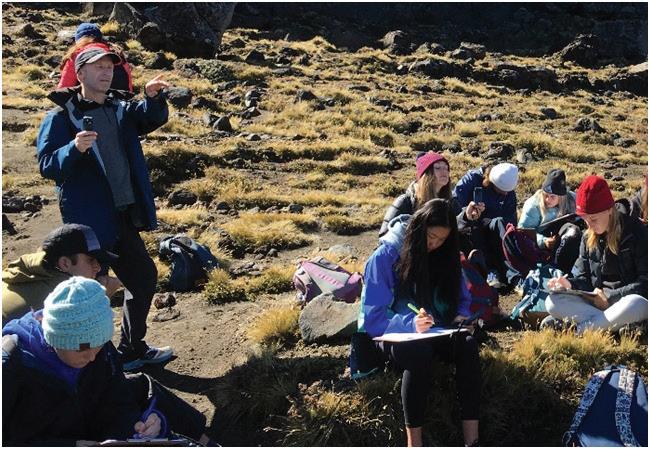
SOCIAL STUDIES
moetai College, here we stand, creating resilient learners where culture, diversity,
social responsibility are valued and all learners achieve.
The Ōtūmoetai College Social Studies programme explores how societies work, and how people can participate as informed, critical, active and responsible citizens. As a multidisciplinary subject, contexts are drawn from a range of subjects including: Classical Studies, Economics, Geography, History, Sociology and Tourism. A critical objective of Social Studies is to allow students to make sense of their present world and to evaluate possible future decisions and actions, by connecting learning with the past, with place, and other perspectives. Students develop strategies for thinking critically, working collaboratively and creatively, to communicate understanding that is deep and meaningful.
The design of teaching and learning at Ōtūmoetai College is predicated on the fact that the future will not be the same as the past
SCIENCE
The Ōtūmoetai College Science programme explores the Nature of Science alongside current socio-scientific issues of local, national and global importance, thus contributing to the Citizenship goal of the NZ Curriculum and our Graduate Profile. Using real-life contexts, learners are encouraged to take risks and make decisions about possible actions, using evidence and critical thinking to justify their opinions. Exposure to a range of texts, symbols, models and key words develops literacy and numeracy skills. Science capabilities are increased through the design and carrying out of investigations, building on prior experience. Active learning through fun and engaging activities helps students increase understanding of important concepts to make connections with Matauranga Māori and the world around them.
PHYSICAL EDUCATION AND HEALTH

The Ōtūmoetai College Physical Education and Health programme provides opportunities for the student to demonstrate their physical skills, social skills, mental skills and values in a range of activities and contexts. Students learn by active engagement and by applying these skills. The course provides educational development in the essential learning areas of the Physical Education and Health curriculum: Physical Activity, Outdoor Activity, Sexuality Education, Mental Health, Sports Health and Physical Safety.
Managed BYOD
(Bring your own device)
Year 9 students are required to bring their own device to school.
Our preferred device, particularly for juniors, is a Chromebook. This is a laptop-style device that runs on Google’s Chrome operating system. It enables your child to work on documents and applications via the Internet. As a rule, a Chromebook is simpler and faster to use, and is often more affordable, than a traditional laptop. It requires an internet connection in most situations.
This kind of device is ideal for our students, as at Ōtūmoetai College we use Google Workspace for Education and every student is issued with a school Google account. Students are required to use this account to access their school work.

If the device gets lost or damaged, students can still access their files by simply logging into their school Google account on another device or Chromebook. As most files are stored online and can be easily accessed through the Internet, Chromebooks have limited hard drive storage.
Chromebooks are available in a range of makes and models to suit different requirements. For more information and details of some recommended suppliers, please refer to the Enrolment section of our website at https://www.otc.school.nz/enrolments.
Before buying a new or second hand Chromebook, we recommend that you check the auto-update expiry date of the device. This is the date after which the Chromebook will no longer receive critical updates. There is a list of these dates online at https://support.google.com/chrome/a/answer/6220366. New Chromebooks will receive 10 years of updates from the date of manufacture, so will last a long time if looked after.
A culture of thinking and learning
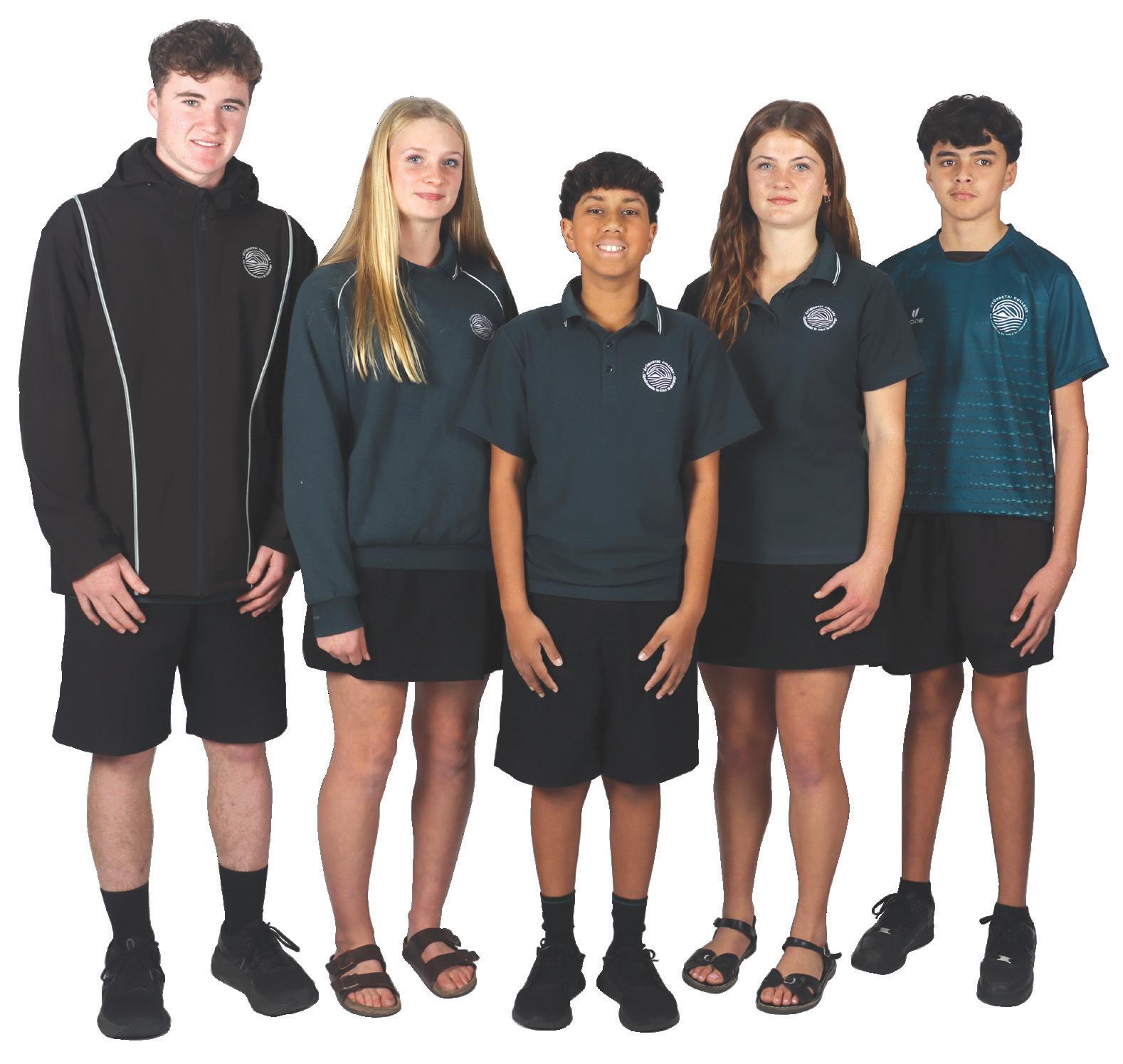
SCHOOL PURPOSE STATEMENT
How we prepare students for life
Kia māramahia te ora e te akoranga Let
learning enlighten life
Our pu rpose
Ōtūmoetai College is an inclusive learning community where identity, optimism and
challenge form the foundation for all learners to fl ourish in a dynamic world. The learning environment will enable students to achieve their personal best in their academic studies, the arts , sport ing and cultural pursuits. During their journey, our students will grow into powerful thinkers and learners who embrace diversity, resilience and develop meaningful relationships with others
This is our purpose and our commitment

An example of our sulu / lavalava, please note white polo shirts are for Years 11-13
Our vision education and social responsibility are valued and all learners achieve.
For full details on our Uniform Code and Regulations – please refer to our website: https://otc.school.nz/uniform/
Ōtūmoetai College, here we stand, creating resilient learners where culture, diversity,
Supplier of our Uniforms:
NZ Uniforms, 94 Elizabeth Street, Tauranga 07 985 6213
The design of teaching and learning at Ōtūmoetai College is predicated on the fact that the future will not be the same as the past
‘All skills will become obsolete except one, the skill of being able to make the right response to situations that are outside the scope of what you were taught in school. We need to produce people who know how to act when they are faced with situations for which they were not specifically prepared.’

Your Deans for Year 9 in 2026 are Mrs Nicola King and Mr Patrick McMahon.
The Deans’ tasks include dealing with class related matters, pastoral care and general administration relating to the Year 9 level.

2026 Deans and Pastoral Team – (from left to right), Mrs Nicola King – Year 9 Dean, Miss Ashleigh Lack – Assistant Principal, Mr Richard Brown – Assistant Principal, Matua Jo’el Komene – Deputy Principal, Tumuaki Kaitiriwā, Kaitiaki, Mr Patrick McMahon – Year 9 Dean, Mrs Vicky Jeffares – Head of the Learning Centre, Mrs Julie Sutton – Head of Guidance & Counselling.
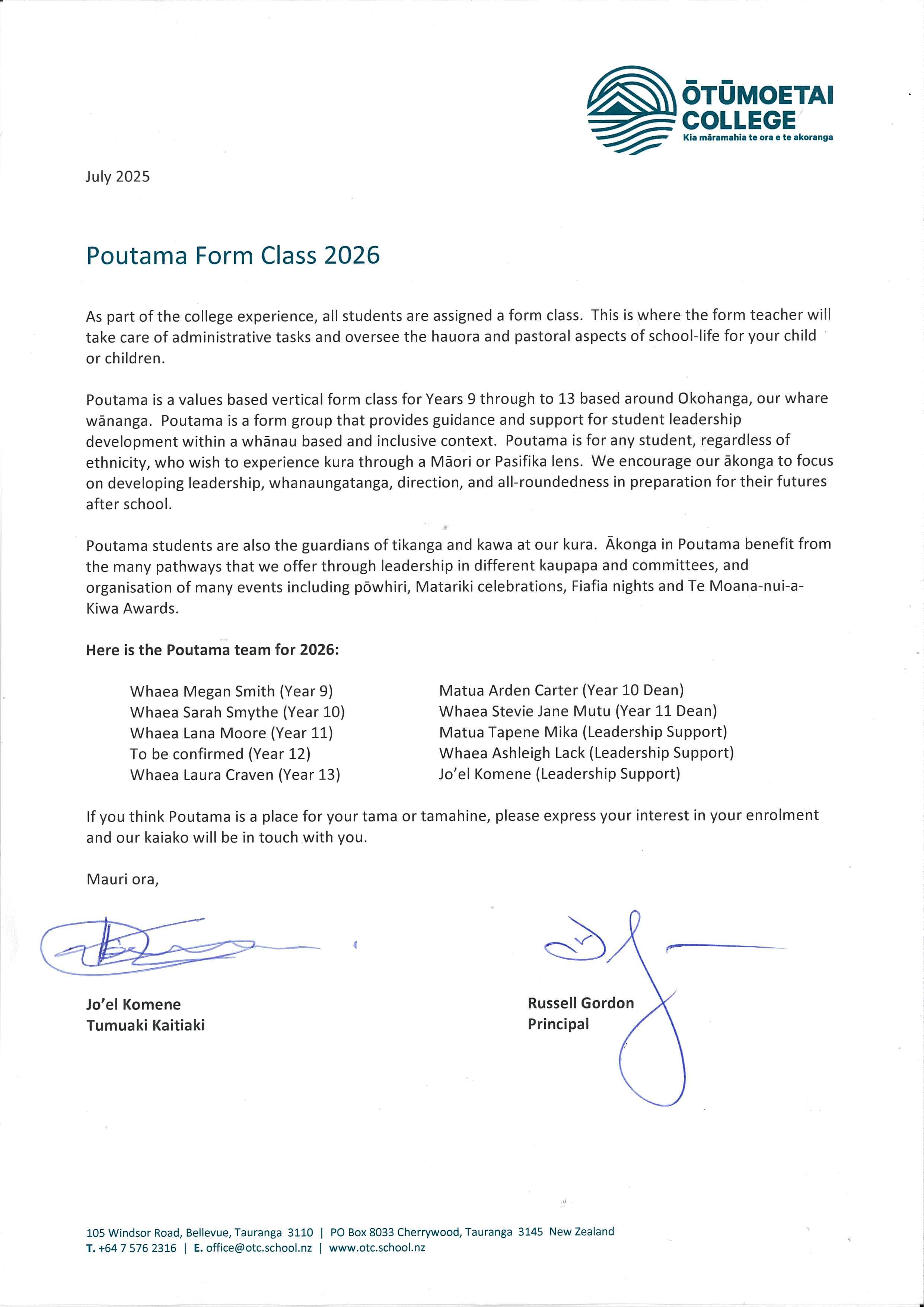
ATTAINMENT

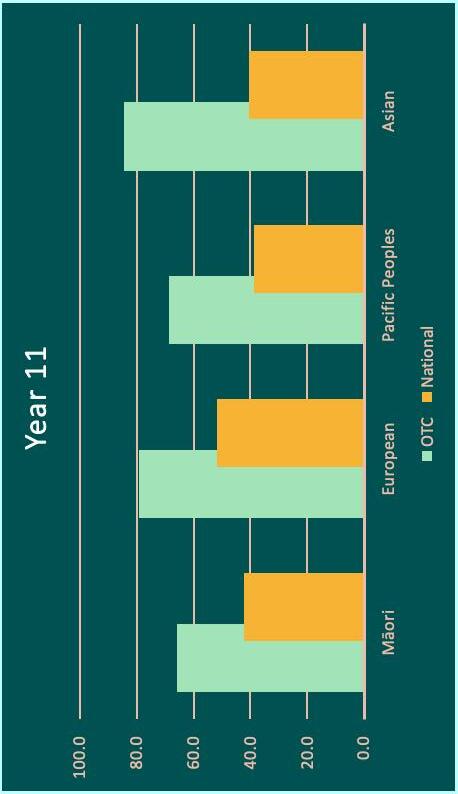


BRING YOUR OWN DEVICE (BYOD) INFORMATION
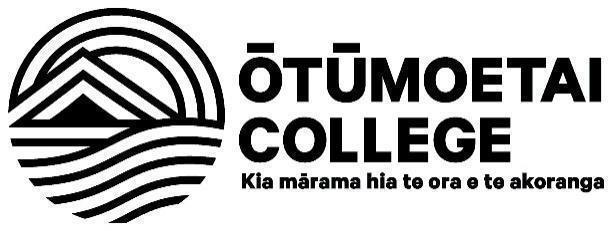
BYOD DEVICE GUIDELINES FOR 2025 / 2026
(go to https://otc.school.nz/enrolments/ for online version with live links)
ALL students are required to bring their own digital device. Tablets including iPads are NOT approved BYOD devices. The following devices are approved:
Chromebook - RECOMMENDED DEVICE for Years 9 and 10.
Chromebooks have the following features:
● low-cost
● long battery life
● requiring minimal software and security updates (which are done automatically and invisibly when the device is connected to the internet)
● wide range of Google and web apps available to students (via their school Google account and Education to Google Workspace for Education)
● requires an internet connection
● please note that there is no option to install additional software on a Chromebook
Chromebooks stop receiving updates after a certain date and may stop working properly and no longer be secure. This date (aka Auto-Update Expiry date or AUE) depends on the make and model. If purchasing a new or refurbished/second hand Chromebook, please check this date with the seller. To get a long life from the Chromebook, look for an AUE date of January 2030 or later.
For more information and a list of AUE’s for different makes and models, please Google ‘Chromebook Auto-Update Policy’ or visit https://support.google.com/chrome/a/answer/6220366?hl=en
The school reserves the right to prevent a device beyond its AUE from connecting to our network.
Laptop - ACCEPTABLE ALTERNATIVE DEVICE
for Y9 & 10, and for Y11, 12 & 13
students studying subjects requiring specialised software.
Students studying subjects requiring subject-specific software, such as graphic design, CAD, digital art, etc, will have access to school-provided software during their classes.
Senior students, and students intending to study one of these subjects when they reach the senior school, may want to use a laptop so that they can install additional software for home use (at their own cost). This is an important consideration as specialised software which is not accessible via a browser cannot be installed on a Chromebook.
If the student has access to, or wishes to purchase, an alternative laptop-type device, this is acceptable but must meet the following requirements:
● the latest version of Google Chrome must be installed
● must retain its charge for the duration of the school day (no charging facilities available at school)
● For Windows devices, must be running Windows 11
● For Mac devices, must be running OSX 11.7 or above
DEVICE SECURITY
● Students are responsible for the safety and security of their own device.
● A sturdy case or cover is recommended for the protection of devices. The device should be named.
● A login password should be in place to protect the device.
TEMPORARY LOAN
(if own device is temporarily unavailable)
● A small number of Chromebooks will be made available in the Library for daily loan to those students whose own devices are temporarily unavailable.
FINANCIAL ASSISTANCE
● In cases of hardship, the school may be able to assist families. Requests will be considered on a case-by-case basis (an administration fee of $25 per term applies for the loan of a school-owned device)
● To apply, please contact Richard Brown, rbrown@otc.school.nz (Y9 and 10) or Ashleigh Lack, alack@otc.school.nz (Y11, 12 or 13).
● Assistance may also be available through Work & Income
BYOD Chromebook deals from Noel Leeming
● Portal: https://www.pbtech.co.nz/education/byod
● BYOD promo code: BYOD2020
● Finance options: https://www.pbtech.co.nz/finance
BRING YOUR OWN DEVICE FAQs
Why is Ōtūmoetai College recommending Chromebooks?
Ōtūmoetai College uses the Google Workspace for Education platform as its primary tool for storing, creating and sharing information.
Particularly in the junior school, the Google tools available on Chromebooks are adequate for students to complete their schoolwork. Chromebooks are a low-cost option and will have a long life when taken care of.
They also have a long battery life and will not need to be charged while at school, which is not permitted. Students must come to school with their devices fully charged.
It is important to note that Chromebooks must usually be connected to the internet for functions to work.
Additional stand-alone software cannot be installed on Chromebooks; however, Chrome apps and extensions may be installed from the Chrome Web store and Google Workspace Marketplace.
My family already owns a device. Won’t that do?
Yes, it may do. We don’t expect families to buy new devices if they already have something suitable. Please refer to the BYOD guidelines in this document. It is vital that any devices meet the minimum requirements.
Note that phones and tablets including iPads are not acceptable learning devices for our BYOD programme.
What features of a Chromebook should I consider?
Chromebooks are manufactured by several different companies. Unlike laptops, they all have very similar features. Choice can come down to personal taste - the look and feel of the device. However, you should consider the following:
Construction - look for sturdy casing and strong hinges plus a strong power cable connector to the device. Some Chromebooks are promoted as being ‘ruggedized’ or ‘military-tested’ - these may offer better construction.
Built-in-camera - This feature is useful for distance learning.
Auto-update expiry date - all Chromebooks have a date at which Google will no longer automatically update the operating system. This date varies between make and model - Google “Chrome Auto-Update Policy” to find the relevant dates. New Chromebooks on the market have a lifespan of 10 years from date of manufacture. Always check before going for a cheap deal or a Trade Me purchase as this may be old stock with a short life!!
What technical specifications are required for my child’s device?
● Chromebook (recommended): must have the latest version of Google Chrome
● Windows: Windows 10 operating system or later
● Mac: Max OSX 11.7 or higher
Do I need to purchase any additional software or virus protection?
There is no requirement for additional software on a Chromebook. At junior level no additional software is required. Virus protection on a Windows or Mac device is essential and is the owner’s responsibility.
How will my child be kept safe online?
Students, parents and schools all play a part in keeping children safe online.
Students: All students are required to sign an agreement which outlines the school’s expectations of how they use digital technology.
School Filtering and monitoring: Students’ online activities will be managed by our wireless, filtering and firewall systems whenever they are logged in to their school Google accounts at school or otherwise. These systems control where students can go online and report back to us when activities of concern are detected. For more information click here
When students or others are using personal Google accounts beyond our school network, no school monitoring or filtering takes place.
Parental supervision: Parents should ensure that they are aware of how students are using their devices.
Support and advice can be obtained from Netsafe, a national organisation committee promoting safety online. 0800 NETSAFE (www.netsafe.org.nz)
The school also provides an online safety hub at https://otc.onlinesafetyhub.nz/ which offers advice and resources to support students, teachers, parents, caregivers and whanau.
How will my child’s device be kept safe at school?
Students are responsible for the safekeeping of their own device at school. The school has security cameras installed in public areas. Parents are advised to have insurance cover. All parts should be NAMED.
We also recommend that devices are stored in a protective case or cover before being placed into school bags for transportation. We are seeing far more damage in devices not kept in cases.
What happens if my child’s device is out of action?
The school has a limited number of devices available for loan on a short term basis. These are subject to availability. A charge may apply.
Are there ways I can finance the purchase of a device?
Various finance options may be available through the vendor of the Chromebook (see the list of preferred suppliers in this document). The school is unable to provide finance for the purchase of devices.
What happens if, for personal reasons, I am not able to purchase a Chromebook at the present time?
In cases of hardship, an application may be made to the school for assistance. To apply, please email Assistant Principals Richard Brown rbrown@otc.school.nz (Y9 and 10), or Ashleigh Lack alack@otc.school.nz (Y11, 12 & 13), or contact them via the school office.
Design thinking is a problem-solving approach that emphasises empathy, collaboration, and experimentation to tackle complex challenges and generate innovative solutions. It originated in the field of design but has since been widely adopted across various industries and disciplines.
Throughout the design thinking process, collaboration and interdisciplinary teamwork are crucial. It encourages a diverse range of perspectives and expertise to inform the problem-solving process. Additionally, design thinking promotes a user-centric approach, prioritising the needs and experiences of the people who will benefit from the solutions. By embracing ambiguity, iteration, and experimentation, design thinking fosters a culture of innovation and encourages the development of human-centred solutions.
The Design Thinking class follows a traditional timetable and all of the students share the same core classes (English / Social Science / Health & Physical Education / Mathematics / Science) to allow synergies to develop between these learning areas and the same students.
This also allows teachers to discuss common strategies and approaches as they are talking about the same students.
One of the key advantages / differences of a Design Thinking class as compared to a more traditional class, is that for one day of the week, the timetable is collapsed for this class to allow for the students to be involved in a project day.


Here students remain in the same classroom space for all of their core classes and the teachers come to them. The project day opens up opportunities for students to engage with distinct assignments that can range from short-term daily projects to longer -term projects that could take up to one to two terms to complete.





The Extended Learner Programme at the College begins in the Junior School and is accessed through the Core Subjects of English, Mathematics, Science, Social Science and Physical Education in Year 10. Students who are selected may be placed in either 2 (English/Social Science, or Mathematics/Science)
Extended Learner subjects to/and including all four subjects, according to their natural strengths, interests and talents.
Selection for the Programme is from a range of data including academic and reasoning data. It may also include reports, student work, standardised testing and communication with parents.
Teaching and learning within the programme is characterised by:
• Emphasis on higher order thinking
• A focus on real world issues/ethical dilemmas/student interests
• Research and Inquiry learning
• Open ended components to task design
• Choice, student voice, creativity
• High Expectations/Excellence
• Curriculum compacting
• Emphasis on growth mindset
Extended Learner Day
Year 10 Students are invited to attend an Extended Learner Day.
The purpose of the day is to challenge the students cognitively, physically, relationally and ethically. This event is a highlight in the Extended Learner Programme.
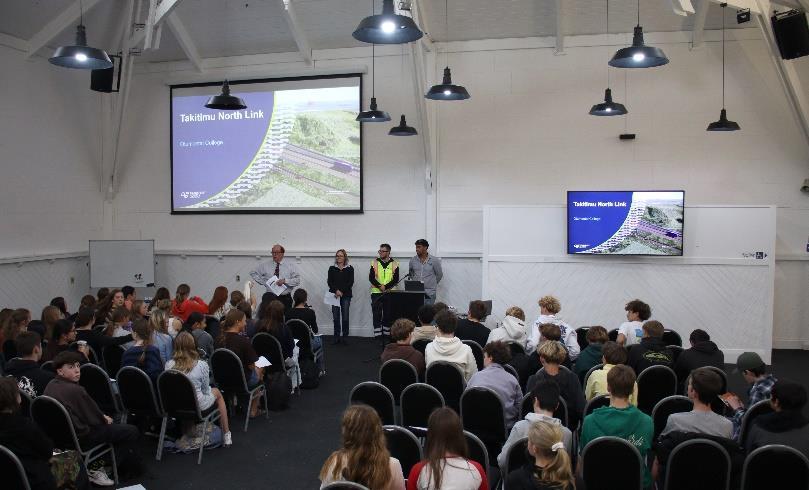




The Learning Centre is a quiet and independent learning environment
At the Learning Centre, we understand that every learning journey is unique, and our goal is to offer the resources and guidance necessary for success.
A key focus of the Learning Centre is to provide tailored support for students requiring special assessment conditions. We work to ensure these students have the necessary accommodations, such as reader/writers, extended time, or assistive technologies, to allow them to demonstrate their knowledge and abilities fairly.
For students enrolled in University study, the Learning Centre offers a variety of services designed to complement your coursework. Similarly, individuals undertaking an Independent Learning Programme will find the support they need to manage their studies effectively and achieve their learning objectives.
We also cater specifically to students studying through Te Kura Correspondence School. The Learning Centre provides a dedicated environment and resources that can help Te Kura students connect with their learning materials, access technology, and receive additional academic assistance.
Our team is committed to fostering an inclusive environment where all learners feel supported and empowered.

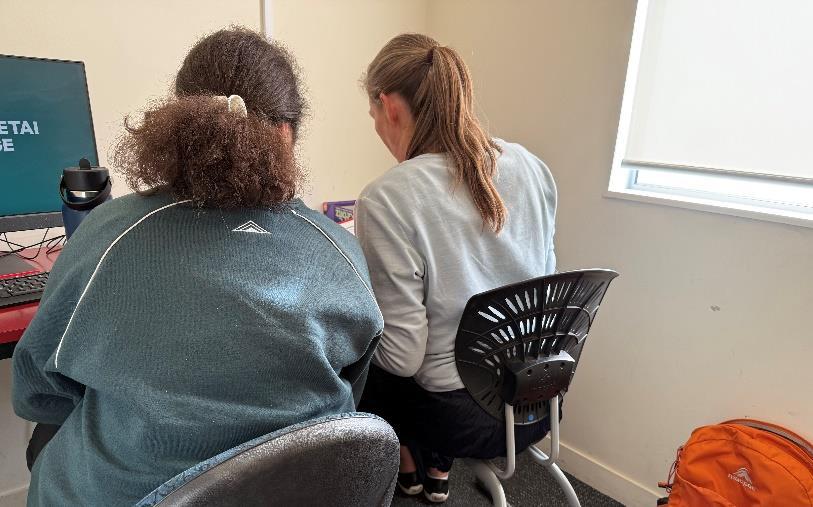



Our Purpose
To offer a supportive environment which enables learners to grow and achieve their academic, social and emotional potential through tailored learning curriculum experiences within core subjects.
Our Vision
To offer a strength-based programme which gives learners a sense of purpose and belonging, empowering them to become confident in themselves and their abilities
Learning Environment
Welcoming, modern classes which provide:
• Differentiated tasks adapted to learner needs
• A mix of independent and collaborative learning, making the most of current technologies
• Opportunities for learners to take risks and persevere to make progress
• Supportive staff who understand complex learning and emotional needs


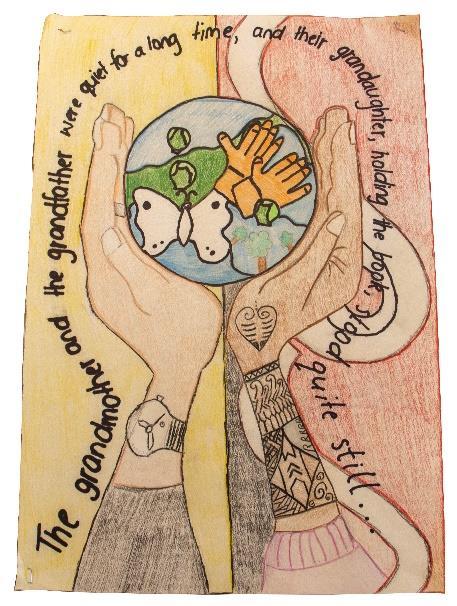
• A quiet courtyard for our students to relax in during breaks
Year 9 English
- Static Image
Patricia Grace 'Butterflies'


The purpose of the Special Needs Department is:
• To ensure that students with intellectual disabilities are fully included within the school system.
• To provide equal opportunities for these students to access school programmes with appropriate support.
• To provide students and their families with sound professional advice and information.
• To facilitate full co-operation and co-ordination between home, school and support agencies.
• To enable the provision of programmes to meet specific identified areas of need.
We are staffed with specialised staff that provide educational programmes tailored to meet individual needs.
Students who are predominantly ORS verified are encouraged to have a mix of both mainstream and department classes in their timetable providing for an inclusive education alongside their peers.


Our area is a place where students feel safe and supported through their school day.
The staff work closely with other professionals in the Special Education field to provide students with the best support.
We provide appropriate support rooms for physiotherapy and speech language needs. Sensory and time out rooms are provided for students who need stimulation or de-escalation from anxiety to access classes.
We also provide adapted programmes, a suitable learning environment, specialised equipment or materials and support for students with their learning so that they can participate fully in education.

Careers & Pathways Department

At Ōtūmoetai College we have a dedicated Career and Pathways Department and place great importance on each and every student having access to quality Career counselling and Pathway planning. We have three fully qualified Careers Counsellors; one whose position is focussed on Vocational Pathways. In addition, we have two support staff and two subject teachers dedicated to providing quality career advice and skills preparation for students.
The Careers and Pathways Team:
• Head of Careers and Pathways:
Mrs Stacey Shefferd
• Pathways Manager:
Ms Eloise Stephen
• Careers Adviser:
Mr Joc McCreary
• Gateway Teacher:
Ms Sherie Curry
• Gateway Placement Co-ordinator:
Mrs Emma Webb
• Careers Administrator:
Ms Retta Dunn
• Early Childhood Studies Teacher and Child Development & Nutrition Teacher:
Mrs Nicola King
Careers:
Deciding which subjects to take at school, making well-informed career and tertiary study plans can be challenging, the Careers Staff are highly qualified and can ensure students with the best possible advice and strategies. In the Junior school, all students will take part in a Junior Careers Programme in Year 10, moving into more individual Careers work in the Senior School.
Pathways:
Vocational opportunities and being responsive to the needs of employment opportunities are a core part of Pathways. Two key programmes are Gateway and Trades Academy.
Gateway is an exciting programme offering students in Years 12 and 13 an opportunity to experience workplaces first-hand while engaging in structured workplace learning.
Trades Academy is a secondary tertiary programme that provides senior secondary students access to a broad range of trades or technology learning opportunities to ensure they stay engaged in education.
Career Central:
Ōtūmoetai College uses Career Central to assist the Career and Pathway Department and the students of the school to develop the Career Management competencies. It is a tool to increase the Careers Education reach in the school and provides students with the opportunity to digitally create their own Career Profile. This will follow them as they move through the school it can be accessed online through a student’s school login




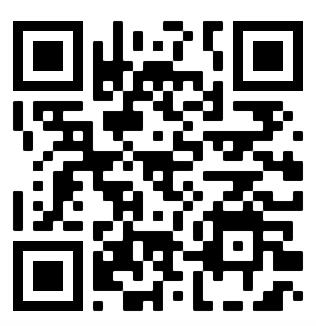
Think children don’t need ART in the 21st Century?
Think again…

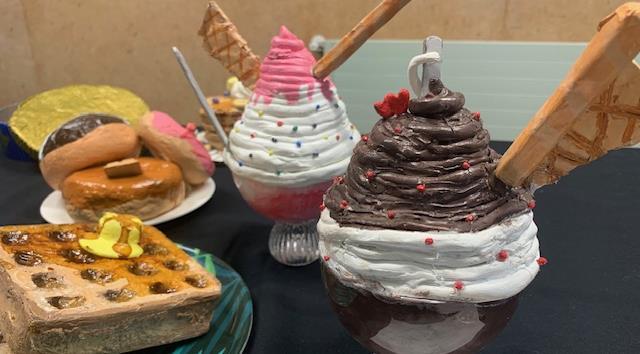
What we do in Year 9 Art:
Drawing
Painting
Sculpture

Art education teaches children to:
Problem solve - keep an open mind, entertain different possibilities. Communicate - interpret visual information, portray a character effectively


Be creative - take risks, develop a sense of innovation. Collaborate and co-operateunderstand their actions affect others, compromise for a common goal
Organise - concentrate and focus, develop motor skills.
Be socially responsible - know and appreciate diverse societies. Be self–directed - develop healthy work habits
Be fluent with technology - create information in a variety of forms and media
Art is an option subject in year 9 and students experience 4 lessons per week over one term where their learning habits are embedded through the application of practical skills, exploration and development of visual ideas and exposure to a variety of disciplines, materials and processes.


At this station you will see displays of student work. Students will demonstrate their skills in coding and design.
Year 9 Digital Commerce is a compulsory one term course that introduces:
● Commerce,
● Digital Tech: Creative Design and
● Digital Tech: Software Development.
In Year 9 students develop their skills across all areas concluding in a team prototype design challenge.
Commerce – Focus on Business and Marketing concepts
Digital Technologies: Creative Design – Principles of design, develop skills in Adobe Photoshop and Illustrator
Digital Technologies: Software Development – Algorithms, Python coding
Digital Commerce Year 9 Product Challenge
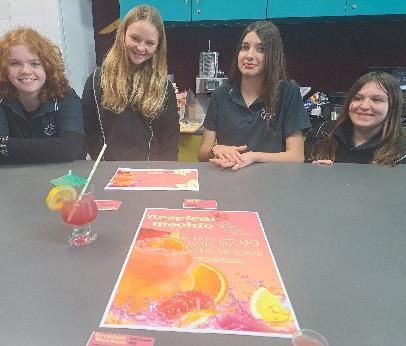
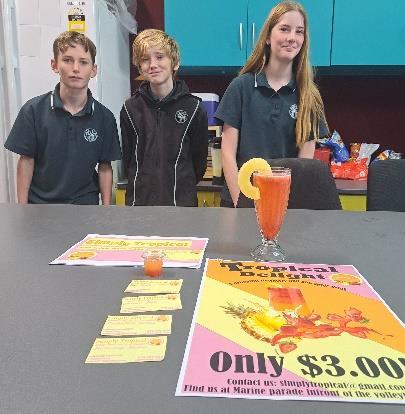
Commerce Market Day
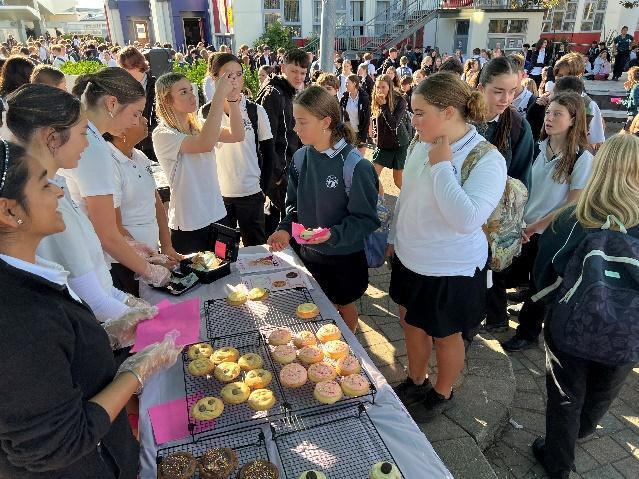
Technologies
Software Development



Year 9 Drama or Dance
What we have on display
• A video of a previous Dance Showcase
• Information on what we do in Year 9 Drama or Dance
• And why it’s compulsory for all students
• Student work samples
• Photos of extra-curricular events
Drama involves the Three C’s Concentration, Co-operation and Communication
Dance involves Co-operation, Creation, Culture and Performance
Extra Curricular Opportunities
Junior Play, College Musical, Dance Troupes & Talent Quest
Drama is delivered through:
Drama games Performing Drama
Movement Improvisation
Group work Script Work
Devising Drama Lots of fun!!!
Dance is delivered through: Whakawhanaungatanga
Hip Hop Comtemporary Fusion
Taste of Pacifica
Cinquain Poem Choreography
Sports Dance



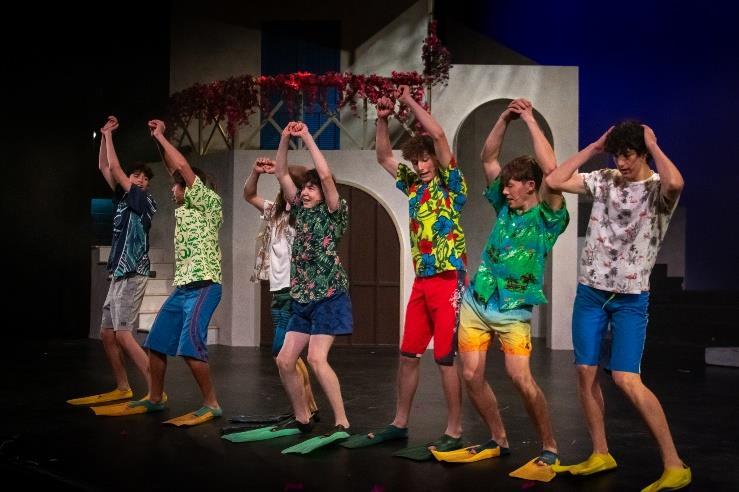






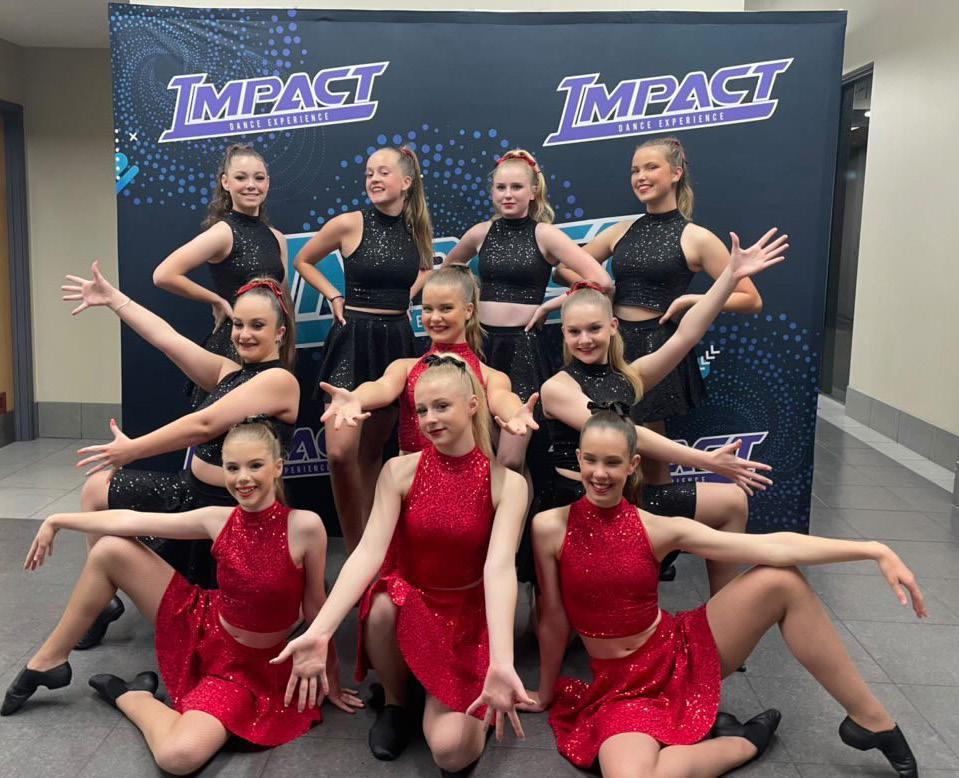


Ingārihi / English & Mahi Pāpāho / Media Studies
Ingārihi/English is the study, use, and enjoyment of the Ingārihi/English language, communicated orally, visually, and in writing, for a range of purposes and audiences, and in a variety of forms. In Aotearoa New Zealand, the study of Ingārihi/English incorporates mātauranga Māori and considers our place in the Pacific.
Students will engage with some of the following:
• A novel, or play
• Poetry, or short stories
• Film
• Grammar
• Reading comprehension
• Creative writing
• Persuasive writing
• Essay writing
• Creation of a static image
• Speeches
• Debating

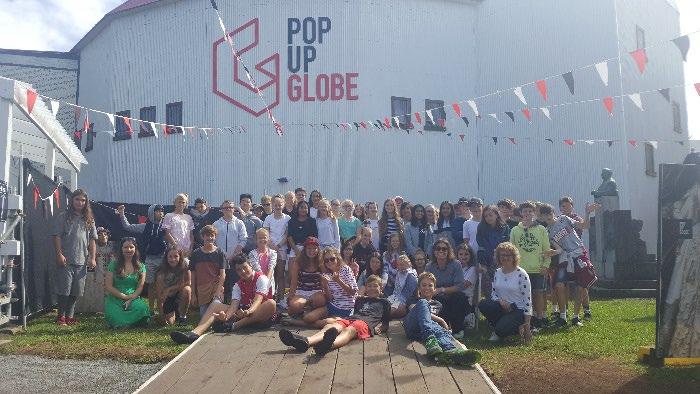




Mahi Pāpāho / Media Studies is about the exploration, analysis, creation and enjoyment of the media and its products.
Ōtūmoetai College
Mahi Pāpāho / Media Studies
NZQA Vocational Pathways
• Creative Industries
• Primary Industries
• Service Industries


Station DisplayJunior Technology Food (Processing) students demonstrating their design skills learned in the one term course
Through exploring the needs and opportunities of our local communities, students research to develop their own designs and concept ideas. Students learn about translating a concept idea into a recipe, and then developing that recipe into a final outcome that is designed to meet a specific brief.
Self-management, creativity, planning, time management, collaboration, teamwork and technological modelling are all key components, while focusing on the development of knowledge and skills in a foods-based context.




Functional Cookies!
For today, the students brief was to design and develop an outcome suitable for ‘Open Evening’ that you could eat ‘on the go’ while navigating our kura Students had to not only consider the size, shape and appearance; they also had to think about how a sweet snack and a hot drink could be incorporated so that they were easily carried alongside college information packs. Through investigation and functional modelling, cookies that could be secured to the top of a cup of hot chocolate, leaving one hand free, quickly became a focus of students design ideas.
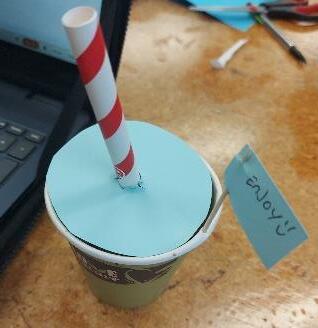
Designing the cookies appearance to be both appealing and exciting led to the ‘Food Theme’ where students designed their own versions of a ‘savoury inspired snack’

In Technology our curriculum is driven by design and innovation. The process of designing and developing an outcome can be explained by John Spencer’s Design Thinking ‘Launch’ cycle. Check it out here!

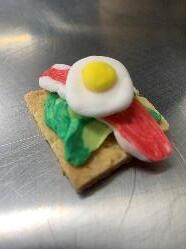
Through learning about empathy our students discussed how they felt on day one at
Ōtūmoetai College and they decided to write some encouraging words for our incoming Year 9 class – these are the flags with messages in your cups –from our student’s hearts, to you!
We hope you enjoyed your sweet treat and you feel intrigued and excited for College in 2026. See you next year!

Year 10 Technology: Soft Materials
At Ōtūmoetai College we are lucky to have some of the best, modern, hightech machinery, e.g. computerised sewing machines, embroidery machines, overlockers, heat press, vinyl cutter, laser cutter, 3D printers.
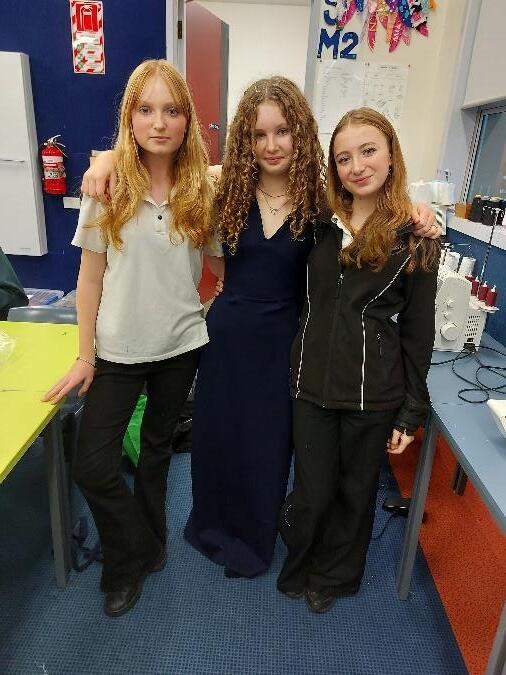



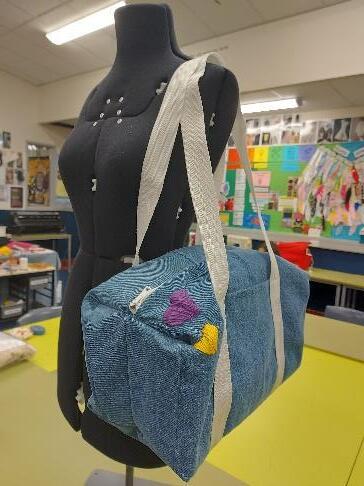




From Year 10, students can select a half or full year program of Soft Materials Technology where they will research, design, problem solve, develop an idea for a final outcome and have fun along the way learning foundational skills and techniques, before creating their own final outcomes.
Following the Technology curriculum, we are driven by design, innovation and problem solving where students are encouraged to explore their creativity and push boundaries when exploring the properties of their materials.

Resistant/Hard materials, Graphics (Design & Visual Communication) & Electronics
What is at the Technology, Graphics and Electronics display?
View a range of Junior technology projects developed using the wide range of exciting equipment and materials on offer.
Get an insight into the world of how technical drawing has changed from pencil and paper to drawing on computers.

Experience the future with 3D printing, robotics, laser cutting and the display of senior work.
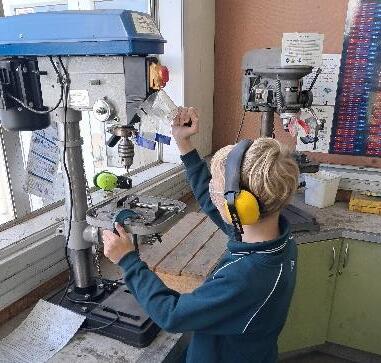





A focus is placed upon the experience of working effectively both as an individual and as part of a team. Students select a design project which is carried through to a quality product that goes home.
All students get the opportunity to take a concept and develop a computer model to explore their own design ability.
Both of the Year 9 courses have 4 periods per week for one term with Electronics courses beginning in Year 10.
Resistant materials Graphics (DVC) Electronics

Let’s talk about…
Okohanga
Year 9 Te Reo Māori
Kapa Haka
Year 9 Te Reo Māori
Tīkanga
Ko wai au?
Matariki
Tauranga Moanatanga
In Year 9 Te Reo Māori, we learn fundamental Māori language skills through being able to say who we are and where we are from. This is done by learning how to say mihi, pēpeha and whakapapa.
From here we begin to learn more about who we are as a kura at Ōtūmoetai College, including our school karakia, pēpeha, haka, and waiata. Including the stories of the whenua upon which our kura is built, we acknowledge Ngāi Tamarāwaho our local hapū.


Kapa Haka
Our school kapa haka is called Ngā
Piki Kōtuku o Ngāti Ranginui. This group is open to all students of Ōtūmoetai College.
In Te Whare Māori, we offer the following courses:
● Te Reo Māori
● Te Ao Māori
● Te Ao Haka
Future career pathways include: education, arts, business, tourism, local government, management, law, public speaking, iwi development, Treaty settlements, translating and interpreting services.


Year 9 Spanish
Learn to have a basic conversation in Spanish
Hola = Hello
¿Cómo te llamas? = What’s your name
Me llamo… = My name is…
¿Cómo estás? = How are you
Estoy…bien/ mal/ feliz/ cansado-a
= I am…good/ bad/ happy/ tired
Tengo…hambre/frio
= I am hungry/cold
Adiós = Goodbye
PRONUNCIATION: Vowel sounds sound like they do in Te Reo Māori. The double L sound (LL) sounds like a Y. The H is silent. All other consonant sounds above are more or less similar to English.
The focus of Year 9 Spanish, which is a semester course, is oral communication. Students learn how to have a conversation about themselves and others, by giving personal details, descriptions of physicality and personality, and by talking about likes and dislikes.
¿Cómo eres?
¿Qué te gusta?
¿Dónde vives?
¿De dónde eres?
¿Tienes hermanos?




In addition, students have the opportunity to investigate an aspect, or aspects, of Hispanic culture that interests them. This could be food, history, culture, a specific country, a sport or sports team, a type of music or dance, etc. Some of these are on display, have a read!
Students who continue with Spanish to senior level will have the opportunity to spend two weeks in a Spanish speaking country, such as Spain or Argentina.
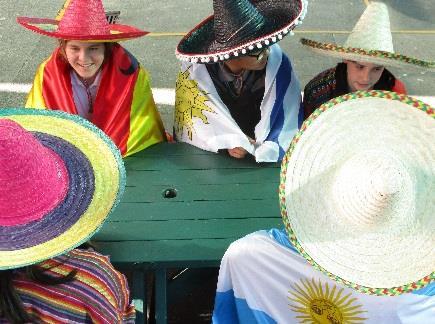





Students will show and tell you about Mathematics & Statistics at Ōtūmoetai College in Year 9.
Take the opportunity to ask any questions you have, try a puzzle or two, and have a look around our facility.
Everyone studies
Mathematics in Year 9
You will have Maths class four times a week
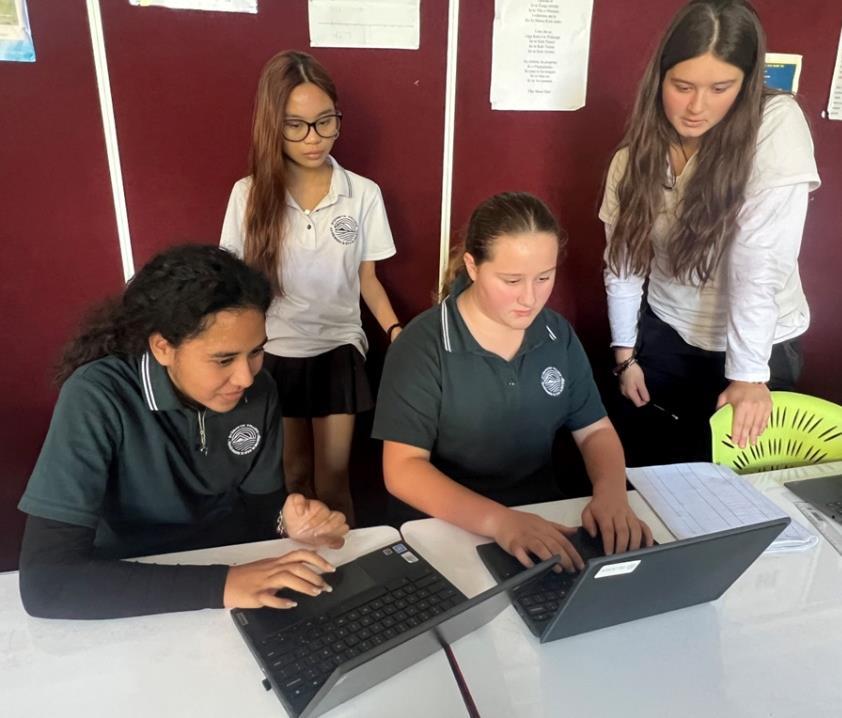
Maths is all about problem solving and making sense of the world around us using numbers, patterns and shapes.
Mathematics lessons are broken down into four parts. Two parts are traditional teaching with instruction led by a teacher. One part will be project based work where students will need to do some investigation.
One part will be student directed, mostly using a web-based platform called Education Perfect.





What’s on display today
A range of the instruments we teach at Ōtūmoetai College are on display. Please explore and experiment with the sounds available and ask us any questions you may have.

What’s on offer!
Rock Bands
Jazz Band
Choir
Song Writing
Guitar Group
String Group
Symphonic Band
Recording
Chamber Music
Music allows people the means to express themselves in a creative and unique way. It allows students to develop self-confidence, creativity and the opportunity to contribute to the wider community.
Year 9 Music is a compulsory subject where we encourage students to explore, experiment and create with a range of sounds, while embracing the social aspects of Music.




The Year 9 Health and Physical Education course provides learning experiences which have a balanced focus on the key areas of learning from the Health and PE in the NZ Curriculum document.
These Key Areas of Learning are:
LEARNING AREA: TOPICS:
Physical Activity


Badminton and Patter Tennis
Sport Studies Netball and Touch Rugby
Hauora Gymnastics & Exercise Fitness
Outdoor Education Aquatics and Low Ropes
Sexuality
Students will participate in 3 hours per week of Health & Physical Education.
All students must be changed for Physical Education lessons. They are required to wear the PE uniform top and black PE shorts.
Our Wonderful Facilities!
• x2 Indoor Recreation Centres
• Fitness Hub
• Indoor Rock Climbing Wall
• Cardio Room
• Strength & Conditioning Room
• Indoor Heated 25m Pool
• x2 Outdoor Covered Domes
• Specialised Netball Court
• Sand Turf
• x2 Rugby Fields
• x2 Football Fields
• Sand Tiger Turf
• Squash Court
• Beach Volleyball Court
• Table Tennis Room



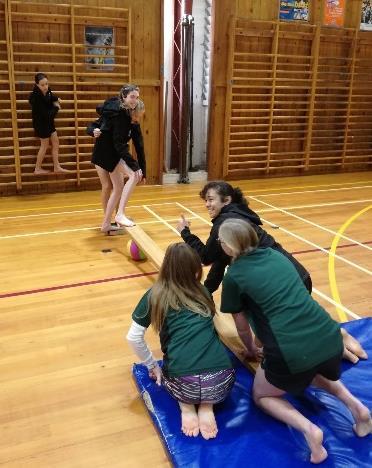


Experience a Science Laboratory
Interactive experiments, displays and demonstrations
Ask us lots of questions, that’s what Science is all about!
The Year
9 programme:
Term 1 - Getting Into Gear
• Laboratory safety, particle nature of matter, changes of state, investigating in Science
Term 2 - What's Out There?
• Space, our Solar System, properties of light, mirrors, refraction and eyes
Term 3 - What's the Guts of It?
• Digestion, nutrition and health
Term 4 - What's my Impact?
• Plants, animals, gasses, microscopes, cells and Ecology
Science is a way of investigating, understanding, and explaining our world and the wider universe. It involves generating and testing ideas, gathering evidence in order to develop scientific knowledge, skills, understanding, and explanations.
Year 9 Science is a core subject which has three lessons per week where we develop critical thinking, innovation, creativity, and key literacy and numeracy competencies.

Science at Ōtūmoetai College helps to develop our future kaitiaki. We explore ways to conserve, replenish and sustain our environment while developing values and practices that contribute to our community.


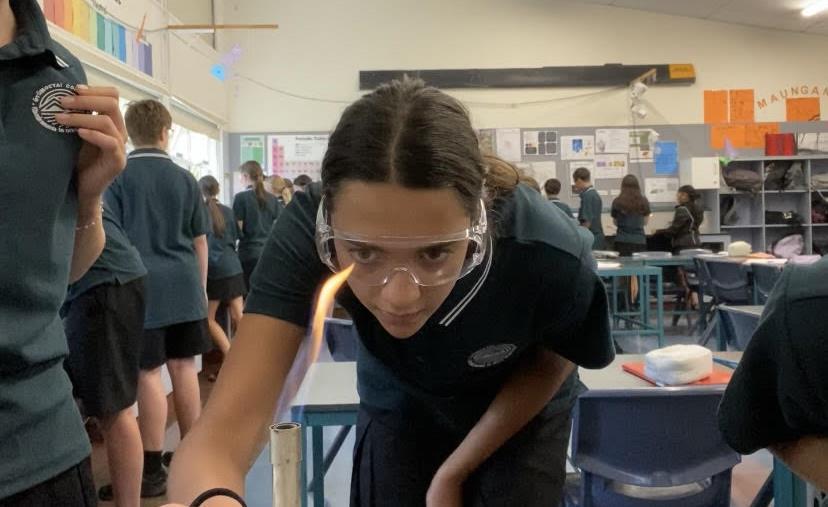

What is Social Science?
The Social Sciences are those subjects that are concerned with people:
• How people organise themselves in their societies;
• How people utilise resources;
• How people interact with their environment; and
• How people have lived in the past
Social Studies is compulsory at Years 9 and 10. This subject brings together concepts and skills from across a range of Social Sciences: Classical Studies, Economics, Geography, History, Sociology and Tourism.
As part of the Extended Learner Programme, there are classes at both levels.
An Integrated Programme incorporating cross-curricular learning is currently being developed and piloted with other departments.


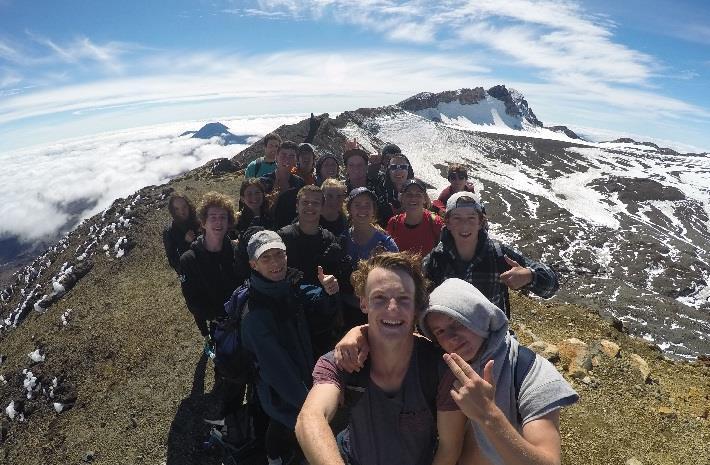
The Year 9 programme:
Me, You
&
New Zealand too:
The focus is on NZ as a multicultural nation with a bi-cultural heritage. Particular attention is given to how individual and national identity has developed over time.
Who Rules?: A comparison of how democracy operates in New Zealand and another system such as Theocracy (Islam and Sharia Law), or a Dictatorship (North Korea) and how those systems affect the lives of people.
Believe it or Not: Ideas and actions of people in the past have impacted peoples’ lives. The focus is on how particular beliefs have affected cultural practices in contexts such as Ancient Egypt, Ancient Greece or the Middle Ages. Links to contemporary situations are explored.
Going Global: The focus is on the positive and negative effects of globalisation, in particular the inequalities created in the production and consumption of products by global companies. A social action opportunity is provided.
This is the first year of a two year programme that covers all of the Level 5 Achievement Objectives in the Social Science Curriculum.





ŌTC Sports Programme
Ōtūmoetai College prides itself on youth sports programmes that are structured to achieve the outcomes of continued Participation, high levels of Performance, and Personal development (the 3 Ps)
To begin with we must focus on the following:
The Process - deliberate play, deliberate practice, and early diversification
The Environment - i e the role of coaches, peers, and parents
To then harness the 3 Ps within our sports programme we concentrate on the intrinsic motivation that is required for our rangatahi to take part.
Self-determination Theory: Autonomy, Competence, Connection = Motivation
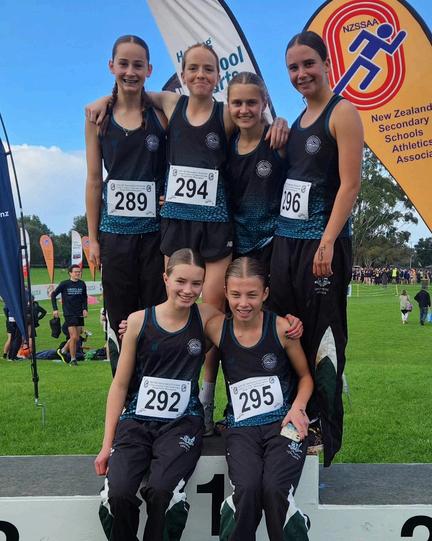
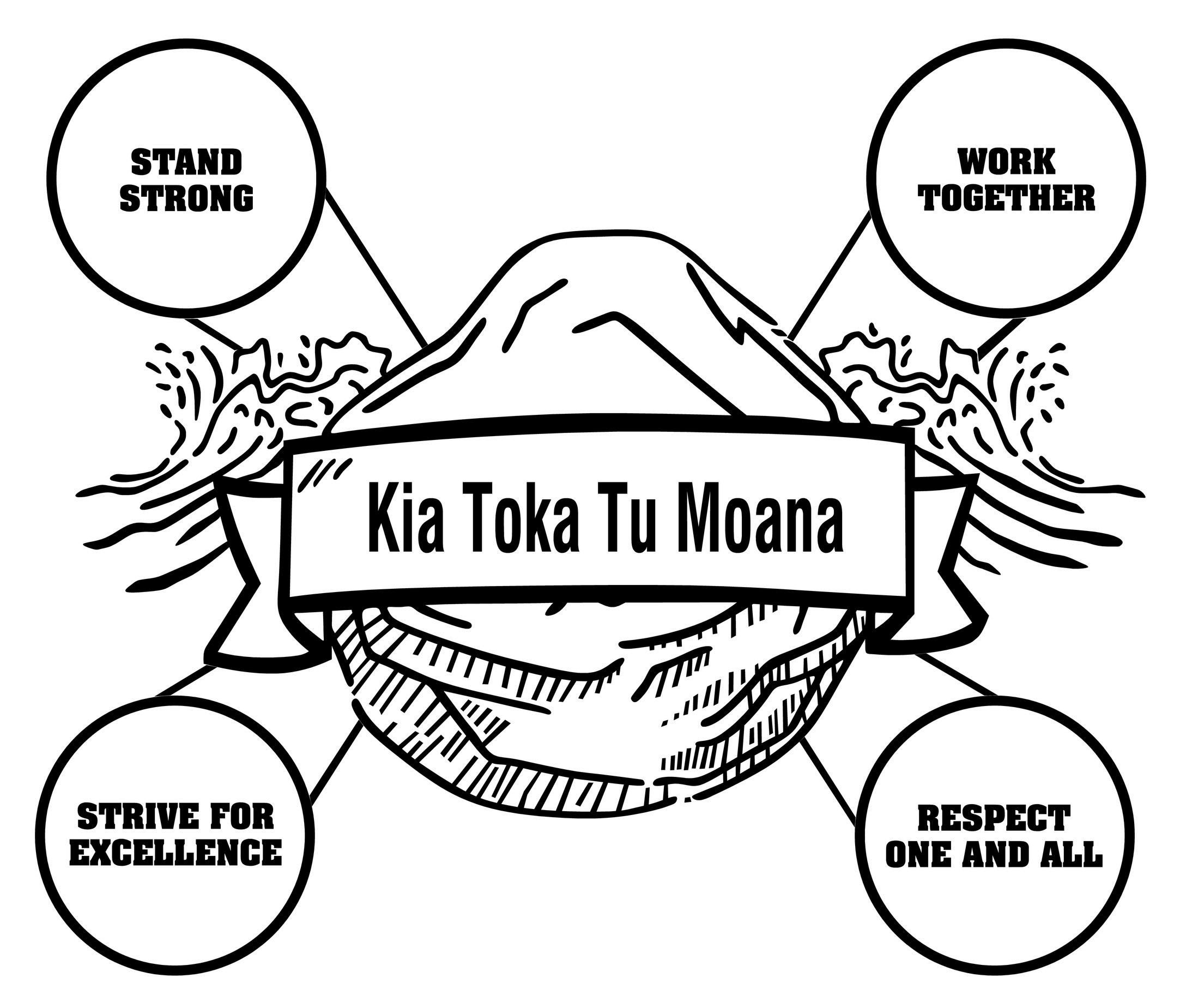
Our school values are instrumental to our sports programme. They help steer our vision of using sport as a vehicle to promote positive development.
Achievement Goal Theory: help students pursue the most appropriate goals and guide them on a path to success. Task or Ego driven.
Task orientation - motivational focus on mastering a task Ego orientation - motivational focus on winning or achieving superior status
ŌTC Sporting Pathways
Ōtūmoetai College offers four clear sporting pathways to support students at every level of engagement: Social, Competitive, Performance, and our new Representative pathway launching in 2025.
Social Pathway – Designed for students who want to stay active, enjoy sport, and have fun with friends. Emphasis is placed on participation, teamwork, and maintaining a healthy lifestyle.
Competitive Pathway – For students committed to regular training and weekly competition This includes all teams playing in local leagues or one-off tournaments Student-athletes are encouraged to take advantage of our Strength & Conditioning programme to support development and injury prevention.
Performance Pathway – Aimed at our top-tier teams (A & B / 1st & 2nd) and those competing at highlevel tournaments This pathway carries higher expectations around commitment, preparation, and representation, both on and off the field
Representative Pathway – New in 2025, this bespoke support programme is for students achieving regional, national, or international honours. It recognises the demands of balancing elite sporting commitments with academic success, offering tailored pastoral support to help student-athletes thrive.
Strength & Conditioning – A requirement for all students, regardless of their sports pathway
Each pathway supports our values of respect, fair play, and pride in representing Ōtūmoetai College
Strength & Conditioning at ŌTC
Ōtūmoetai College’s Strength & Conditioning (S&C) programme plays a key role in developing wellrounded, resilient athletes. It focuses on enhancing mobility, stability, proprioception, general strength, power, speed, coordination, and balance, all essential to improving movement quality, boosting sportspecific performance, and reducing injury risk
All sessions are led by Dr James Forster, a highly qualified S&C coach with over 9 years of experience working with athletes from youth development to the professional level, including the WaiBOP Magic. James holds a PhD in Sport and Exercise Science, bringing a strong scientific foundation to his practical coaching
Programmes are tailored to suit each student’s stage, sport, and goals, with an emphasis on strength development, agility, speed, power, and injury prevention. James is committed to long-term athlete development and ensures all students are supported in achieving their potential - physically, mentally, and athletically
Whether students are playing for fun or competing at the highest level, S&C at ŌTC ensures they are building the foundations for success both on and off the field.


Kia m ramahia te ora e te a korang a For more information contact:
Windsor Road, Bellevue, Tauranga p. 07 576 2316 f. 07 576 8903




